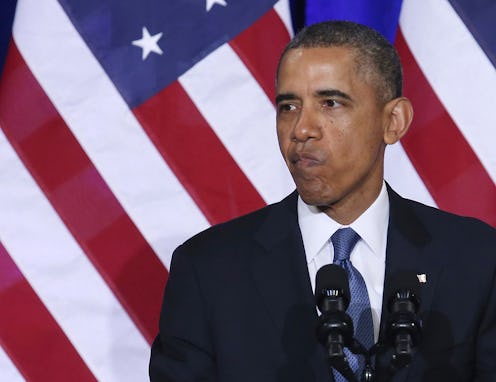News
How Critics Reacted To Obama's Big NSA Speech
President Obama delivered a much-anticipated speech on government surveillance programs Friday, announcing reforms to how the National Security Agency collects data and the manner in which that data is stored. It was obviously a speech intended to assuage civil libertarians and other critics of the NSA, but did it work? That depends who you ask — but so far, the consensus seems to be that no, it didn’t.
A couple of NSA critics had nice things to say about the speech. Senator Mark Udall, one of the few members of Congress to publicly criticize the NSA’s programs, called Thursday “a milestone day,” and praised Obama’s reforms.
“It’s been a lonely fight. I feel like I’ve been a voice in the wilderness for a number of years,” Udall said. “The bulk collection program is going to end as we know it … that’s a big deal.”
But many who were outraged over the NSA collection practices before this week remain outraged now. Glenn Grenwald, who helped get this whole debate started last year when he published the Edward Snowden-leaked NSA documents, is one of them. In a lengthy op-ed at the Guardian, Greenwald was highly critical of Obama and the reforms, writing that Obama "drapes the banner of change over status quo perpetuation."He continued:
Ultimately, the radical essence of the NSA – a system of suspicion-less spying aimed at hundreds of millions of people in the US and around the world – will fully endure even if all of Obama's proposals are adopted... That's because Obama never hid the real purpose of this process. It is, he and his officials repeatedly acknowledged, ‘to restore public confidence’ in the NSA. In other words, the goal isn't to truly reform the agency; it is deceive people into believing it has been so that they no longer fear it or are angry about it.
Wikileaks founder Julian Assange also didn’t mince words, calling Obama’s speech “embarrassing” and accusing him of “speaking for almost 45 minutes and say[ing] almost nothing.”
“This president has been dragged kicking and screaming to today’s address. He is being very reluctant to make any concrete reforms and unfortunately today, we also see very few concrete reforms,” Assange said. “What we see is kicking off the ball into the congressional grass, kicking it off into panels of lawyers that he will instruct to report back at some stage in the future.”
Most of the criticism centered around the accusations that Obama’s reforms don’t really amount to much. Rand Paul said that Obama’s solution to the criticisms amounted to “the same unconstitutional program with a new configuration,” while Carl Messineo and Mara Verheyden-Hilliard of the Partnership for Civil Justice Fund alleged that “what are billed as ‘reforms’ are mere window dressing, cosmetic changes that leave this unconstitutional system intact.”
The Washington Post’s Greg Sargent thinks that the speech may actually the opposite effect than what was intended, placing a spotlight on the ideological gulf between Obama and his detractors rather than narrowing it.
“[W]hile Obama’s speech went some way towards addressing concerns held by civil libertarians, it also confirmed that his core difference with them remains,” Sargent wrote. “Civil libertarians don’t believe that bulk collection of telephone metadata should be required by the government — no matter who collects it. This isn’t to say they oppose government access to metadata on principle, provided a court green-lights it and provided phone companies had voluntarily kept that data. It’s the government-mandated collection of this data that’s the problem.”
The most telling reaction may have been from Peter King, a congressman from New York who vociferously supports the NSA’s data collection.
“I would hope that what the president is doing will satisfy much of his critics [so] that we can get this reauthorized and continued the way it should be,” King said after the speech. He added that “99 percent” of the NSA’s programs will be untouched by the reforms.
That’s basically an admission from one of the NSA’s strongest proponents that the speech was a PR move, and that nothing major will really change. Wonderful.
One person who would almost certainly be criticizing the speech — if he were still around — is vintage 2005 Barack Obama:
